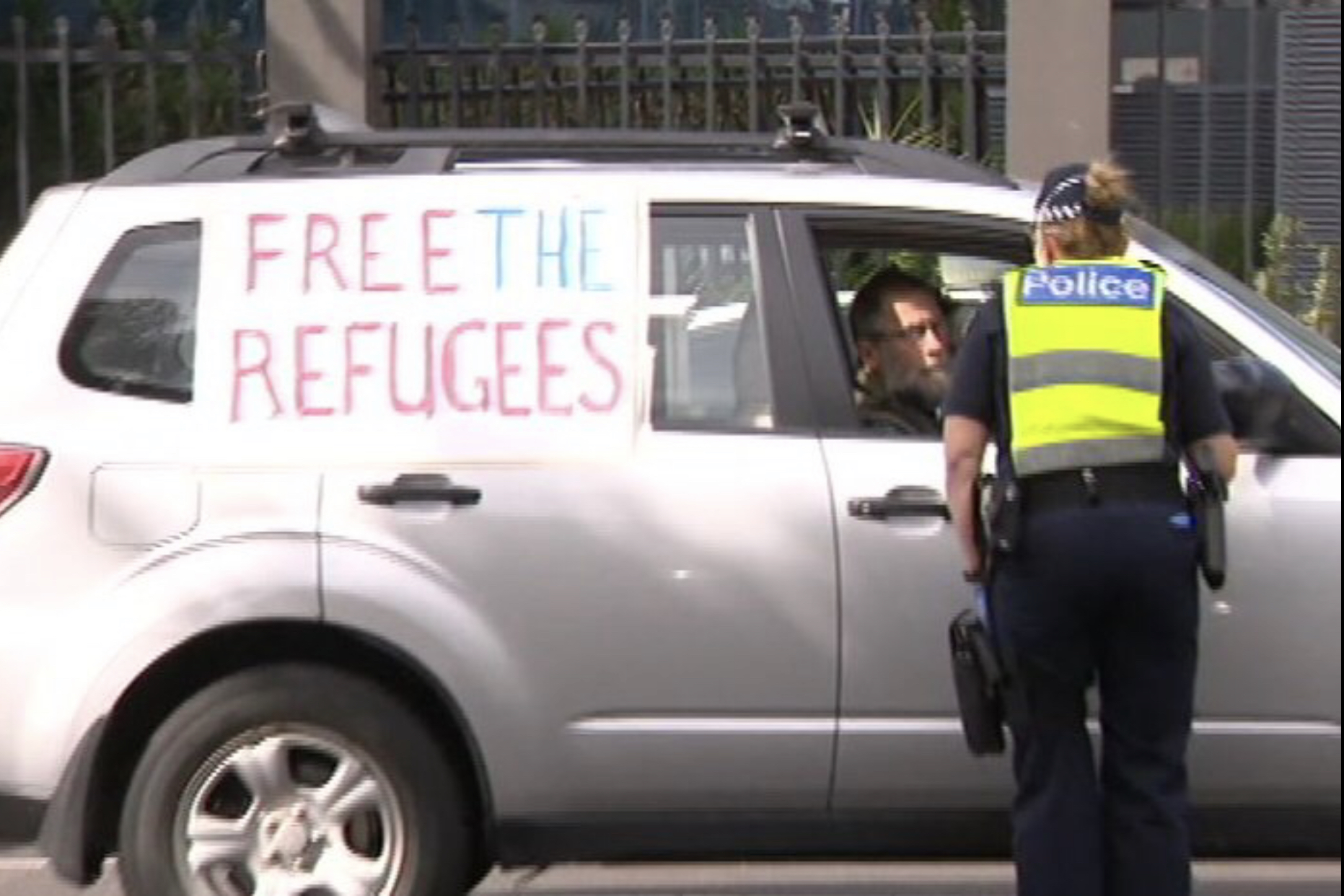Share This Article
By Sahar Adatia and Jimmy Singh.
Last month, police were forced to arrest one refugee activist and fine another 26 almost $43,000 after they held a car convoy protest on the street outside a hotel in Melbourne’s north where refugees and asylum seekers were being detained.
ABC News reports that at around 2pm on 10 April 2020, Victorian police intercepted a car and bike cavalcade as it made its way to the Mantra Hotel in Preston, which was holding at least 40 male refugees.
The demonstrators surrounded the hotel to demand the release of the exiles from their high-risk environment in the hotel, which put them at increased risk of contracting COVID-19.
The protest came against an open letter signed by over 1,000 doctors and professionals from the health industry the previous month calling for asylum seekers and refugees being held in detention, including hotels, to be discharged into the community during the deadly coronavirus pandemic.
The letter was scripted by Sydney paediatrician and refugee campaigner, David Isaacs, who advocated that hotels being used as detention sites “constitute a very high-risk environment for detainees’ mental and physical health”.
The refugees had come to Australia under the Medevac legislation and many had health conditions, which also made them vulnerable to COVID-19.
It is believed they were sleeping in up to three per room and in activity areas including the TV room which did not have sufficient space for social distancing.
Protest Stopped on Streets as Refugees Watch Arrests from Hotel Windows
Nevertheless, police swiftly halted the fleet of protesters in their cars and bikes outside the Mantra Hotel as refugees were left to witness the scenes of protest and arrest from their hotel windows.
One of the organisers of the protest, Chris Breen, was arrested at his house and charged with inciting a protest.
Speaking to SBS News, he said was transported to Preston police station where he spent nine hours in custody as officers acquired a warrant to seize his phone and home computers.
“it’s absurd. People can drive to Bunnings, to get a haircut, to go to your holiday house in Victoria, but we aren’t allowed to drive around the block to highlight the deadly conditions for refugees,” Mr Breen Said.
Mr Breen will face court in August.
Meanwhile, several others were fined with traffic offences, and another 26 individuals were also fined for their involvement in the rally.
It is also understood that police took down the names and details of the drivers and bike riders in the over-30 strong convoy with the threat of being fined “for not staying at home” under coronavirus restrictions.
Have questions? Call us today. Our specialist criminal defence lawyers are based in Sydney, and are happy to help.
The Right to Protest in Australia
The right to protest peacefully is a defining feature of liberal democracy.
Indeed, the freedom to assemble and rally allows citizens to express their views on societal issues that are important to them and to press for legal and social change.
Protests are often associated with a diverse range of contentious issues, although in recent times, all over the world, climate change and the mining of coal have seen a particular concentration of protest activity.
Across Australia, the right to protest is encouraged specifically by mutual cooperation between protesters and the law.
The Human Rights Law Centre advises on this, underscoring that in some circumstances, the government or law enforcement is able to enforce restrictions on how a protest is held, and these must be adhered to.
Generally speaking, protests are policed by prohibiting certain activities that may be too disruptive, or adjusting timing or location, in order to regulate conduct for public purposes.
For example, keeping the law in mind when protesting can include respecting matters such as trespass of private land, offences relating to obstructing traffic when participating in a protest, obscenity and late-night noise regulations.
Other restrictions may also come into force specifically around protest activity, such as police determining the route of a protest march.
Ultimately, protesting in Australia is a valued right, one which finds its harmony in acknowledging that protests often cause disruptiveness designed to capture public attention and the fact that protesters also need to abide by regulations and laws that apply to public conduct and gatherings.
If you are going to participate in a protest, then you must abide by the relevant laws in the process of doing so.
When it comes to blocking traffic, which is a common outcome of protests, under NSW law, it is an offence to cause an obstruction to traffic, unless you happen to have a reasonable excuse.
The is reflected in section 6 Summary Offences Act 1988 (NSW) which outlines the law on obstructing traffic in NSW.
The offence of obstructing traffic in NSW carries a maximum penalty of $440.
Book a Lawyer Online
Make a booking to arrange a free consult today.
Call For Free Consultation
Call Now to Speak To a Criminal Defence Lawyer
Over 40 Years Combined Experience
Proven SuccessAustralia-Wide
Experienced LawyerGuarantee
 (02) 8606 2218
(02) 8606 2218
 (02) 8606 2218
(02) 8606 2218














